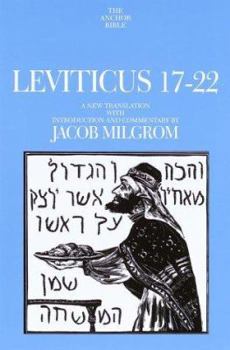Leviticus 17-22: A New Translation with Introduction and Commentary
(Part of the The Anchor Yale Bible Commentaries Series)
This volume is a new translation, introduction and commentary on the book of law that shaped the religion in Israel. This description may be from another edition of this product.
Format:Hardcover
Language:English
ISBN:038541255X
ISBN13:9780385412551
Release Date:December 2000
Publisher:Anchor Bible
Length:656 Pages
Weight:2.35 lbs.
Dimensions:1.6" x 6.4" x 9.6"
Customer Reviews
3 ratings
excellent...but the price?
Published by Thriftbooks.com User , 16 years ago
Milgrom's work is important for any advanced study of Leviticus. But prices at over $400 simply cannot be right. This work is available in many places on the internet for less than $80.00 if not less than $50.00 NEW!
Truly outstanding scholarship
Published by Thriftbooks.com User , 19 years ago
Any attempt to explain to the 21st century this ancient text is a monumental undertaking. While it is possible to get lost in the detail, the scholarship here shines through so that the text can be useful for us - today.
Milgrom Continues his definitive commentary on Leviticus
Published by Thriftbooks.com User , 23 years ago
Just as Leviticus 17-22 builds and expands upon the themes contained in Leviticus 1-16, so too Milgrom's commentary on Leviticus 17-22 continues to build upon many of the themes and insights he laid out in his earlier commentary on Lev. 1-16. Milgrom's translation and commentary on the first sixteen chapters of Leviticus (Anchor Bible vol. 3) is perhaps the finest modern commentary on those chapters and this work deserves it place alongside Milgrom's initial volume. No doubt Bible scholars will find his work fascinating but even if you are not a scholar but simply a person like myself who wants to understand Leviticus better, Milgrom's commentary can shed new light on what is for many modern readers a very difficult book. Some cautions before proceeding with the review: if you reject the modern theory that the first books of the Bible are composed from several sources commonly labeled "J", "E", "P", "H", and "D", then you likely will find Milgrom's work objectionable because one of the main theses of Milgrom's work is that chapters 17-27 reflect chiefly the source referred to as "H" for the "Holiness" source while chapters 1-16 are composed chiefly of writings from "P", the "Priestly" source. Secondly, although Milgrom's translation of the entire book of Leviticus is set out at the beginning of his commentary in this volume and his discussion of each chapter is preceded by his translation of that chapter, nevertheless, in the commentary portion, isolated Hebrew words and phrases are transliterated into English letters which occasionally Milgrom does not immediately translate into English. Unfortunately, Anchor does not set out the transliteration system so unless you are already familiar with it, you have to noodle it out yourself or look up the passage. Moreover, Milgrom frequently employs specialized grammatical terms that will baffle the average reader. Nevertheless, if you are willing to work hard trying to understand the work, you will reap huge benefits even if you are not a modern Bible scholar.In his first volume, Milgrom argued that Leviticus transforms the ancient sacrificial system by banishing demons and identifying man's choices as the major source of impurity. Man's sin generates impurity that pollutes the Tabernacle and the more serious the sin, the more polluted the Tabernacle. Sacrifices, chiefly the chattat or purification offering (erroneously translated as "sin offering" by others), would purge the Tabernacle of impurity but only if motivated by the offeror's sincere remorse. If the pollution goes unchecked, G*d will abandon the Tabernacle and the people.In this volume, Milgrom argues that the impurity system in chapters 1-16 has been expanded. Whereas in chapters 1-16, holiness centered on the Tabernacle and the priesthood, in these chapters, the concept of holiness is expanded to encompass the land and the "lay" Israelite. The land of Canaan now functions like the Tabernacle in the wilderness. Sin pollutes the land and pollu






